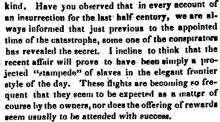Washington Correspondence
Washington, May 18, 1850.
The chronic agitations of the session still continue with an infusion of some additional elements of bitterness form other sources, while some leading men of both parties are striving to the utmost to carry the measure of the compromise proposed by Mr. Clay as Chairman of the Committee of Thirteen, the charmed number which revives so many revolutionary associations. It is believed that it will pass the Senate by a small majority, but no one can justly pretend to say what will be its fate in the House. There were times when, amid the strong delineations of the two principal parties, and under the stern discipline that controlled them, it could be predicted with certainty how each man would vote, but such is not the case now. The slave question has made havoc of all such discipline. There is now a weighing of responsibility, an individual accountableness to conscience as connected with this subject, which awakens unusual anxieties in the bosoms of legislators. Party lines are, at least for the time, obliterated, and men are obliged to vote so as accurately to reflect the will of their constituents. This merging of partyism is more noticeable at the South, where everything yields to slavery. Strong efforts are now making to establish in this city a journal especially devoted to Southern interests as understood in the strongest sense, the columns of the Union to being sufficiently racy and decided on the all-important question.
The scene of the recent reported insurrection was Monroe County in South Western Virginia, in the vicinity of White Sulphur Springs. There has, no doubt, been an exaggeration of the real danger, as rumors on such a subject are always magnified to an extraordinary degree. Nor is that a portion of the State from which such intelligence might be expected, since the general tendencies among the whites are to freedom, and the treatment of slaves is of a lenient kind. Have you observed that in every account of an insurrection for the last half century, we are always informed that just previous to the appointed time of the catastrophe, some one of the conspirators has revealed the secret. I incline to think that the recent affair will prove to have been simply a projected "stampede" of slaves in the elegant frontier style of the day. These flights are becoming so frequent that they seem to be expected as a matter of course by the owners, nor does the offering of rewards seem usually to be attended with success.
The Committee on the "Galphin claim" have reported, and the report is unfavorable to Mr. Crawford of the War department. It maintains, 1. That the claim was not originally good against the United States; 2. The payment was rightly made under the act of 1848. But 3. The payment of the interest, (which was enormous) was against law and precedent. The whole thing has brought, in the eyes of many, discredit on the Cabinet, against which the editors of the Republic, while ardently attached to the President, have been writing, and now have suddenly resigned their editorial charge of the President's oracle, rather than compel him to dismiss his Cabinet or any one of them, which the old General dislikes to do, even though there is much opposition to them among those of the same party. It is all a system of party manoeuvreing, the results of which it is impossible to foretell, nor would your readers be much interested in any prediction that might be hazarded. These busy actors will soon pass off the stage; the scene will close; the curtain will fall, and they be forgotten. Of the evanescent nature of earthly fame to the mass of men now prominent on heights of influence and power here, one may be satisfactorily convinced by visiting the Congressional burial ground,a nd contemplating the inscriptions on the hundred monuments there erected to the memory of public men. A striking commentary is there presented on 1 Peter, 1:24, "All the glory of man is as the flower of grass."
The Episcopal Convention for the State of Virginia, is in session at Alexandria. Hundreds of the laity and ladies attend daily its sitting and the preaching of the Word, which is maintained in two churches three times a day. They came from various quarters, one steamer bringing one hundred, another two hundred, and the hourlies from this city carrying many to and from each city. There are one hundred and nineteen ministers in the diocese, most of whom are present. Bishops Meade and Johns preside. Dr. Stone of Brooklyn, has been in attendance and preached. The sessions commenced on Wednesday and will close this (Saturday) night. The principal subject of discussion has been that of worldly amusements. The Bishops have been very anxious to obtain a public expression of the opinions of the members of the Convention, and a vote on the question of "admonishing and repelling from the Lord's table, those who might be guilty of gaming, attendance on horse-racing, and theatrical amusements, witnessing immodest and licentious exhibitions of shows, attending public balls, habitual neglect of "public worship" &c. After a full discussion continued throughout the day, it was decided by a large majority, that all these offences were disciplinable.
The first American bishop ever consecrated was Dr. Seabury of Connecticut, in 1784. Forty-nine American diocesan bishops have been consecrated.--Of these, nineteen have died, two been suspended, (the Onderdonks) and twenty-eight are now in the field of labor.
After diligent inquiry into the most authentic sources, I find no reason to alter or amend anything I have said about the Christian character of the great statesman, John C. Calhoun, during the latter years of his life, down to the closing scene. Many "run well" for a time. D.
"Washington Correspondence," Boston (MA) Recorder, May 23, 1850, p. 2.

